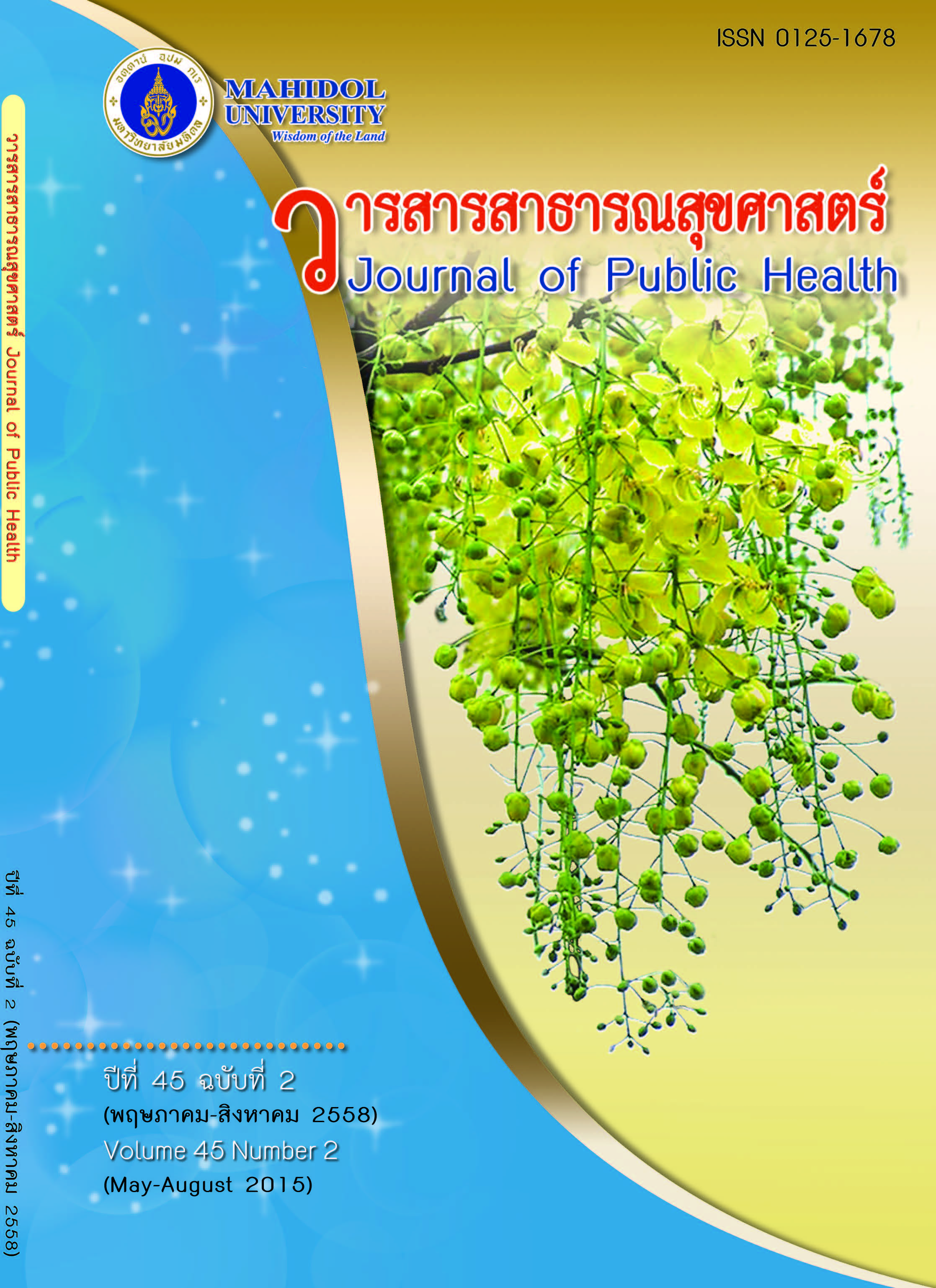ผลของการบริโภคน้ำผักผลไม้ผสมใยอาหารต่อการขับถ่ายอุจจาระในผู้ที่มีภาวะท้องผูก
Keywords:
ใยอาหาร, เด็กซ์ตริน, โพลีเด็กซ์โตรส, อาการท้องผูก, dietary fiber, dextrin, polydextrose, constipationAbstract
บทคัดย่อ
จากข้อมูลการสำรวจภาวะสุขภาพของคนไทยพบว่า ปัจจุบันคนไทยบริโภคผักผลไม้น้อย เป็นสาเหตุหลักทำให้เกิดปัญหาท้องผูกและเพิ่มความเสี่ยงของการเกิดโรคมะเร็งลำไส้ใหญ่ การบริโภคใยอาหารในปริมาณ 25-30 กรัมต่อวัน จะช่วยป้องกันและรักษาอาการท้องผูกได้ การศึกษานี้มีวัตถุประสงค์เพื่อศึกษาผลของการบริโภคน้ำผักผลไม้ผสมใยอาหารต่อการขับถ่ายอุจจาระในผู้ที่มีอาการท้องผูก รูปแบบการวิจัยเป็นเชิงทดลองแบบสุ่มชนิดปกปิดสองด้านมีกลุ่มควบคุม (Randomized, Double-blind, Controlled Trial) กลุ่มตัวอย่างถูกแบ่งเป็น 2 กลุ่ม กลุ่มละ 30 คน กลุ่มแรกบริโภคน้ำผักผลไม้ผสมใยอาหาร (ใยอาหารปริมาณ 10 กรัม) วันละ 300 มล.กลุ่มที่สอง บริโภคน้ำผักผลไม้ (ใยอาหารปริมาณ 2 กรัม) วันละ 300 มล. เป็นเวลา 4 สัปดาห์ ประเมินการขับถ่ายอุจจาระทุกวันเป็นระยะเวลา 7 สัปดาห์ รวมทั้งวัดสัดส่วนของร่างกายในสัปดาห์ที่ 0 และ 4 ผลการศึกษาพบว่า การบริโภคน้ำผักผลไม้ทั้ง 2 กลุ่ม ช่วยเพิ่มความถี่ในการขับถ่ายอุจจาระ เพิ่มปริมาณอุจจาระ รูปร่างอุจจาระอ่อนนุ่มมากขึ้น สีอุจจาระดีขึ้น ความรุนแรงของกลิ่นอุจจาระลดลงเมื่อเปรียบเทียบกับก่อนการทดลอง โดยเห็นผลในสัปดาห์แรกหลังการบริโภคน้ำผักผลไม้ (p<0.05) และมีแนวโน้มสูงกว่าในกลุ่มที่บริโภคน้ำผักผลไม้ผสมใยอาหาร การศึกษานี้ชี้ให้เห็นว่าการบริโภคน้ำผักผลไม้ผสมใยอาหาร และน้ำผักผลไม้ช่วยทำให้ระบบการขับถ่ายอุจจาระดีขึ้นในผู้ที่มีอาการท้องผูก
The Effect of Fiber Added Fruit and Vegetable Juice Consumption on Defecation in Subjects with Constipation
ABSTRACT
The national health examination of Thai people indicated that Thais consumed fruit and vegetable less than the recommended amount. This might be one of the factors causing constipation and colon cancer. A dietary fiber intake of 25-30 grams a day helps prevent and relieve constipation. The aim of this study was to evaluate the effects of fiber added fruit and vegetable juice consumption on defecation in subjects with constipation. This study was a randomized, double-blind, controlled trial. Subjects were divided into 2 groups (30 subjects per group).The experimental group consumed fruit and vegetable juice with added fiber (dietary fiber 10 grams) at 300 ml a day. The other group consumed fruit and vegetable juice (dietary fiber 2 grams) at 300 ml a day. The consumption period was 4 weeks. The defecation of each subjects was assessed daily and every week for 7 weeks. Anthropometric measurement was measured at week 0 and week 4. The results showed that consumption of both fiber added fruit and vegetable juice and fruit and vegetable juice increased stool frequency, stool volume, softer stool consistency, improved stool color, with a decrease in stool smell compared to the baseline. The results became apparent from the first week with a statistical significance (p<0.05), and tended to pose effectiveness in the fiber added fruit and vegetable juice group. This result indicated that consumption of fiber added fruit and vegetable juice and fruit and vegetable juice improved bowel movement in subjects with constipation.
Downloads
Issue
Section
License
Creative Commons License CC-BY-ND


